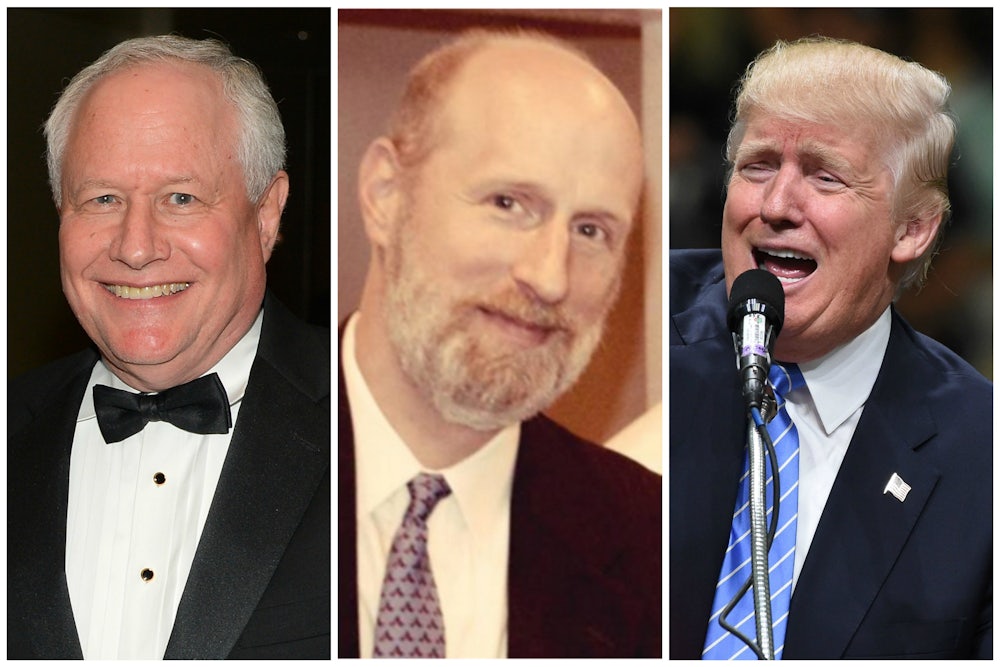Over the course of the last year, Donald Trump has humiliated his foes within the Republican Party by consistently proving them wrong—none more thoroughly than Weekly Standard editor and neoconservative stalwart Bill Kristol, whose long history of making faulty political predictions was extended by his repeated insistence throughout the primaries that we had already reached #PeakTrump.
Now Kristol has embarrassed himself in ways that go beyond luckless prognostications. Since December, he has been floating the idea of fielding an independent candidate to stand for true conservatism if Trump were to win the Republican nomination. It became a favorite parlor game for Washington pundits: Who could this champion be? To thwart a menace like Trump, it would have to be someone with fame, or wealth, or a formidable political resume. An ideal figure would be Mitt Romney, who has all three. But while Kristol did meet with Romney about a stop-Trump effort, the 2012 Republican nominee resisted the pundit’s advances. Other prominent names were bandied about: General James Mattis, former Senator Tom Coburn, current senators Ben Sasse and Tom Cotton. The suspense built. Last weekend, Kristol tweeted: “Just a heads up over this holiday weekend: There will be an independent candidate—an impressive one, with a strong team and a real chance.” Then Bloomberg broke the news: Kristol’s anti-Trump savior was David French.
David who? Mark Halperin and John Heilemann, the veteran Bloomberg reporters who got the scoop, admitted they “hadn’t heard of” French, a writer for National Review. Even in the world of right-wing journalism, French, an Iraq War vet and attorney, is an obscure figure. As of today, he has 33,600 followers on Twitter, far less than Kristol’s 57,500. French lacks fame, wealth, and any real political experience. Some, including my New Republic colleague Ryu Spaeth, wonder why Kristol didn’t just run himself.
Why would Kristol think that French is the hero the conservative movement needs to fight Trump and Clinton? Partially it’s a matter of scraping near the bottom of the barrel. It’s clear that Kristol’s first, second, third, fourth, and fifth choices turned him down. We don’t know how many more people Kristol had to call on his Rolodex before finding one—French—amenable to the idea of a presidential run, but it is likely to be a number with many digits in it.
But beyond desperation, Kristol’s choice has a certain logic to it. In stark contrast to the libertine Trump, who displays a casual indifference to social issues like abortion and LGBT rights, French is a devout social conservative, a Calvinist who delights in the idea of eternal damnation. In 2010, French argued that stigmatizing homosexuality served to create a healthy society. “As we de-stigmatize homosexuality, the human toll continues to mount,” French lamented. As Dylan Matthews notes at Vox, French’s “writing betrays a deep, enduring concern about secular forces impinging upon religious liberties and enforcing dangerous ideas like ‘women should be allowed to serve in combat’ and ‘trans people should be able to go to the bathroom where they like.’”
French’s Christian conservatism explains the logic of why he, rather than Kristol himself, would be the figurehead for the anti-Trump effort. Kristol is a neoconservative, a small and relatively secular faction within the Republican Party which has found it politically expedient to ally itself with evangelical Christians, who are far more numerous but often lack the academic and policy expertise of the neoconservatives. Neoconservatives are primarily focused on foreign policy, making up the hawkish wing of the Republican Party that has consistently pushed for an expansive American global presence and military adventures like the Iraq war. Dominating the GOP’s foreign policy apparatus but having little traction with public opinion, neoconservatives found it convenient to make common cause with evangelicals.
Kristol’s father, Irving Kristol, was one of the key architects of this alliance. As Irving explained in 1984, he saw a confluence of interest between right-wing evangelical Christians and neoconservative Jews who were pro-Israel hawks. “Why should Jews care about the theology of a fundamentalist preacher when they do not for a moment believe that he speaks with any authority on the question of God’s attentiveness to human prayer?” he asked. “And what do such theological abstractions matter as against the mundane fact that this same preacher is vigorously pro-Israel?” Social conservatives were sound allies for neoconservatives, Irving said, much more than “libertarian conservatives” who were indifferent to morality. (He left silent the salient fact that “libertarian conservatives” are much less hawkish on military matters.)
It’s because of the importance of the neoconservative alliance with evangelical Christians that Bill Kristol has decided to recruit French rather than support the Libertarian Party, whose Gary Johnson-Bill Weld ticket looks like a much more credible anti-Trump force on the right.
Donald Trump is a disruptive force in the Republican Party, breaking up longstanding alliances and friendships. Kristol is surely thinking to the future, to how to rebuild the party in the neoconservative mold after Trump’s likely loss in November. Trump’s version of right-wing politics has little use for the neoconservative agenda of sustained military interventions and nation-building. Supporting French, however strange a candidate he might seem, is a way of keeping the lines of communication open with evangelical Christians, so that when the time to rebuild comes, Kristol and the neoconservatives have some building blocks to work with.
Neoconservatives have often been accused of being chickenhawks, always ready to send others to die in feckless and ill-conceived wars. In the form of David French, Bill Kristol has found another foot soldier, ready to do battle for a doomed cause.
